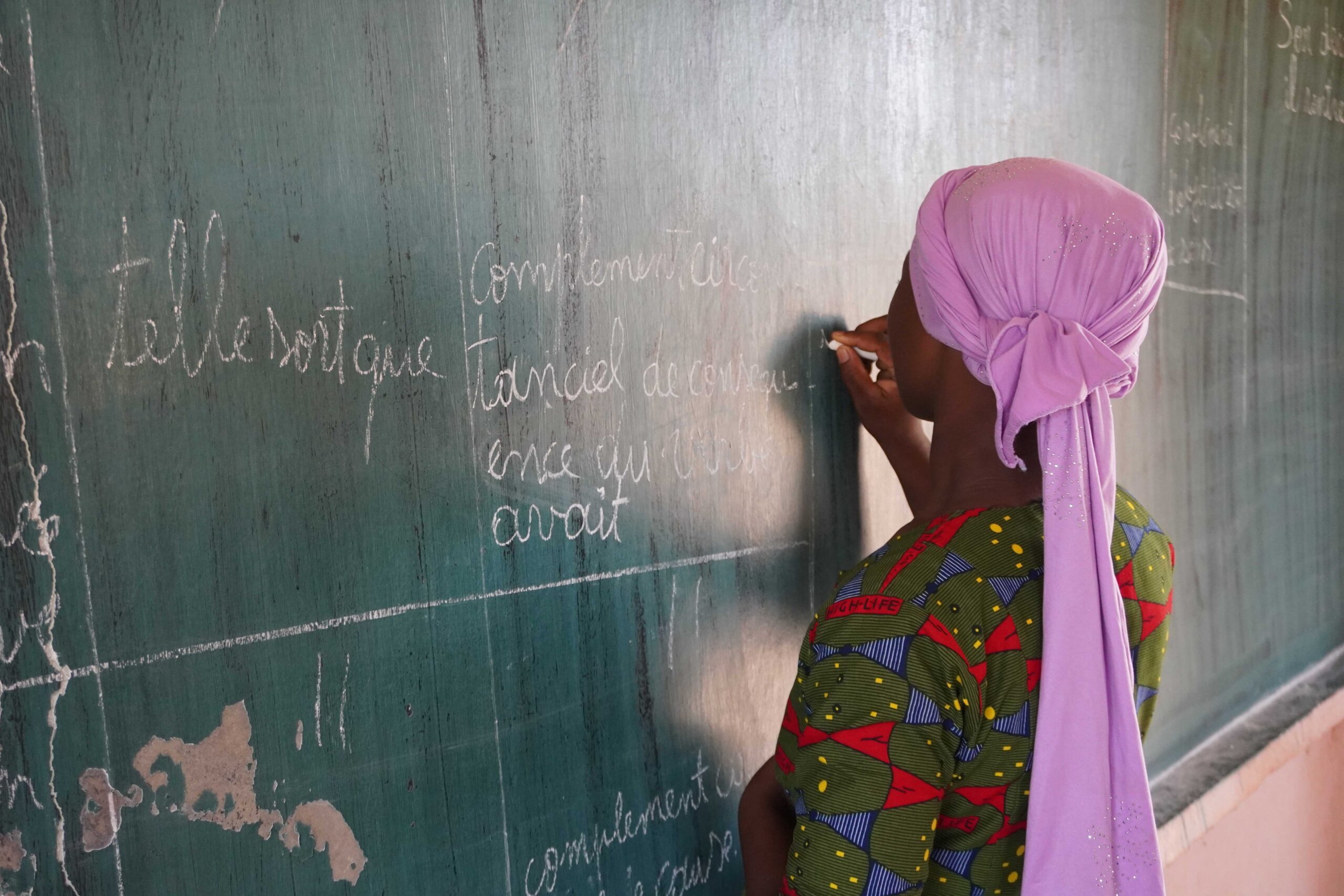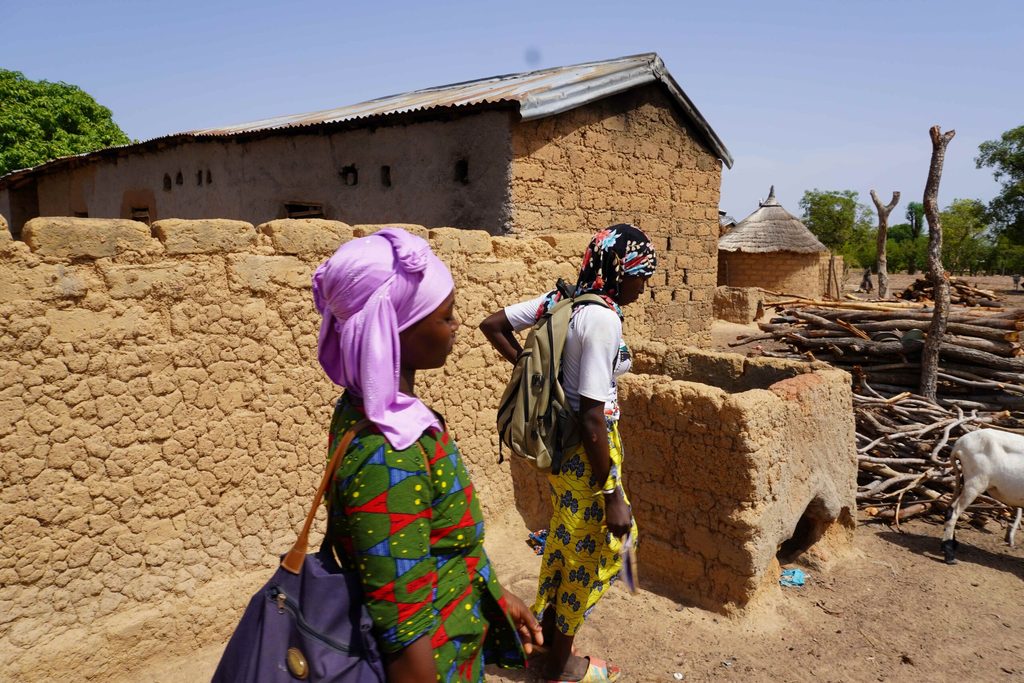Mariam: determined to return to school despite child marriage
The World Economic Forum estimates it will take 131 years to reach gender equality. But we say, that’s just NOT good enough. Mariam's plan to Beat the Clock is to finish her studies, join a health school and become independent in the future.

Mariam has returned to her studies © Abdourahmane Coulibaly
Despite being married at 15, Mariam is back in school, learning about her rights and is creating a better future for her family.
Mariam*, an 18-year-old mother with a 2-year-old daughter, lives in a rural area of the region of Bougouni in Mali, where child marriage remains common.
Her education was severely disrupted after being forced into an early marriage when she was just 15. Today she has returned to her studies and is determined to complete her secondary education.
“I was given in marriage at the age of 15 when I was in 5th grade. I didn’t know my husband, no one asked my opinion,” she shares. Since getting married, Mariam has moved back and forth between her family home and that of her husband, despite him having moved to Libya to look for work.
“I fell behind in my studies. I had to repeat classes because I had to help my parents in the field during the growing seasons. This was the case in both the 4th and 5th grade,” says Mariam, who eventually dropped out of school.
“I was given in marriage at the age of 15 when I was in 5th grade. I didn’t know my husband, no one asked my opinion.”
Mariam
Determined to study Mariam seeks out community assistance
Determined to return to her studies, Mariam sought out her local councillor to ask for her assistance in returning to school. “I had to find a solution to continue my studies or at least pass my exams,” explains Mariam.
“I was approached by Mariam, who is from my village, as her family wanted her to join her in-laws for their harvest. I and other influential people in the community, including the principle of the school and the staff of the learning centre, met with the family. Mariam’s parents had to negotiate with her in-laws. From what we have learnt, the father-in-law does not look favourably on the education of girls, and that is another problem,” says Councillor Djinèsira.
For Councillor Djinesira who participates to Plan International programme called “Break Free”, Mariam’s situation was quite delicate, so she decided to bring up her case during an advocacy meeting held at community level.
Through mediation, Mariam’s family and in-laws finally agreed that she could return to school and she re-joined her class in 7th grade. The Principal of Mariam’s school personally called her husband to ask for his consent. “He has no problem with this. But as you can imagine, in our country it is the parents who decide,” says the Principal.
Looking to the future
Mariam now hopes to pass her Diploma of Fundamental exams and pursue her upper secondary education, despite the difficulties she faces being a young mother. “Mariam is a motivated person because she doesn’t miss classes,” shares her Principal.
She is also resolved in her commitment to tackle child, early and forced marriages and says she cannot understand why girls should be forced into marriage at such a young age.
“I can’t think of any reason why my parents wanted to give me away in marriage. I think adults don’t value girls’ education. I sincerely wish to pass my exam and continue my studies. I want to join a health school even though I know that with my parents and especially my in-laws it won’t be easy,” Mariam concludes.

Child marriage has dire consequences
In Mali, 16% of girls are married before they turn 15, and 54% before the age of 18. One of the poorest countries in the world, poverty, gender inequality and the belief that girls are somehow inferior to boys are the key factors driving this trend.
Some parents marry off their daughters at a young age to give them what they perceive will be a better life, reducing their economic burden and allowing them to demand a higher bride price. This practice continues promoting the belief that girls are the property of their husbands.
However, early marriage has dire consequences for girls, including early pregnancy and dropping out of school early, which severely impacts women’s prospects of leading productive, fulfilling lives.
“The issue of child marriage is very common in the community. When we manage to keep girls in school it is really a good thing. Personally, I even allow girls who have children to bring them with them so they can breastfeed. I have married girls who have been able to continue their education beyond the basic school diploma by joining vocational training courses,” explains the Principal at Mariam’s school.
About the project
Mariam was part of Break Free!, a 5-year (2021-2026) joint programme by Plan International, SRHR Africa Trust and Forum for African Women Educationalists in collaboration with technical partners The Royal Tropical Institute and Rozaria Memorial Trust and funded by the Dutch Ministry of Foreign Affairs.
Through Break Free Plan International aims to address sexual and reproductive health and rights (SRHR) and gender-based violence among thousands of girls; working with youth groups, community volunteers, teachers, women’s groups and health workers by running awareness raising campaigns and advocacy initiatives on child marriage, teenage pregnancies, female genital mutilation/cutting and other harmful practices, reaching girls aged 10 to 19, as well as community leaders.
Break Free! works with adolescents in 9 African countries so they can make their own free and informed choices about their sexual and reproductive health in order to combat teenage pregnancy and child, early and forced marriage, and in some countries female genital mutilation and cutting.
The Break Free! programme is implemented in Burkina Faso, Ethiopia, Kenya, Malawi, Mali, Mozambique, Niger, Sudan, and Zambia.
*Name has been changed to protect identity.
Beat the Clock
A girl gets no say, a girl gets no rights, a girl must ‘play to type’ – it’s a story as old as time. But we say, that’s just NOT good enough. The World Economic Forum estimates there will be 131 years until gender equality in the world for girls.
That’s why we’re embarking on an unrelenting, collective mission to Beat the Clock; in order to inspire the world to come together, to learn, take action, donate, advocate, champion, speak up and speak out, as an ally to the cause. Every action counts in bringing about equality to all girls, everywhere.
We won’t stop until we are all equal.
Categories: Education, Protection from violence, Sexual and reproductive health and rights



